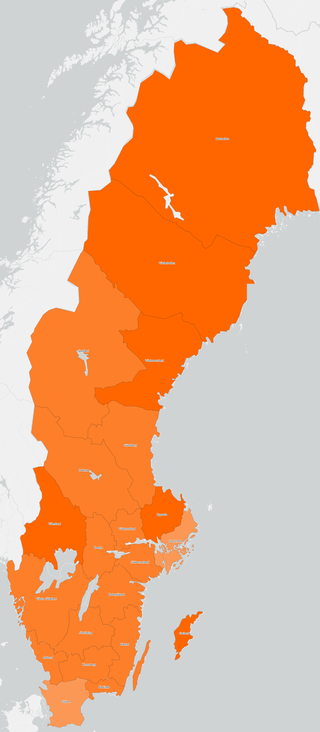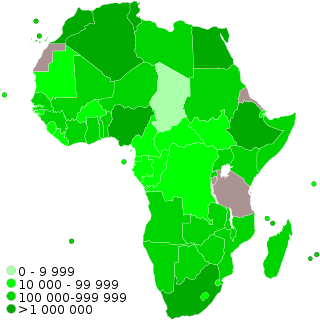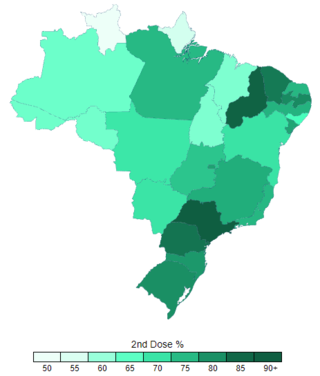A vaccination policy is a health policy adopted in order to prevent the spread of infectious disease. These policies are generally put into place by state or local governments, but may also be set by private facilities, such as workplaces or schools. Many policies have been developed and implemented since vaccines were first made widely available.

A COVID‑19 vaccine is a vaccine intended to provide acquired immunity against severe acute respiratory syndrome coronavirus 2 (SARS-CoV-2), the virus that causes coronavirus disease 2019 (COVID‑19).

The Oxford–AstraZeneca COVID‑19 vaccine, sold under the brand names Covishield and Vaxzevria among others, is a viral vector vaccine for the prevention of COVID-19. It was developed in the United Kingdom by Oxford University and British-Swedish company AstraZeneca, using as a vector the modified chimpanzee adenovirus ChAdOx1. The vaccine is given by intramuscular injection. Studies carried out in 2020 showed that the efficacy of the vaccine is 76.0% at preventing symptomatic COVID-19 beginning at 22 days following the first dose and 81.3% after the second dose. A study in Scotland found that, for symptomatic COVID-19 infection after the second dose, the vaccine is 81% effective against the Alpha variant and 61% against the Delta variant.
Vaccination requirements for international travel are the aspect of vaccination policy that concerns the movement of people across borders. Countries around the world require travellers departing to other countries, or arriving from other countries, to be vaccinated against certain infectious diseases in order to prevent epidemics. At border checks, these travellers are required to show proof of vaccination against specific diseases; the most widely used vaccination record is the International Certificate of Vaccination or Prophylaxis. Some countries require information about a passenger's vaccination status in a passenger locator form.

COVID-19 vaccination in Switzerland is an ongoing immunization campaign against severe acute respiratory syndrome coronavirus 2 (SARS-CoV-2), the virus that causes coronavirus disease 2019 (COVID-19), in response to the ongoing pandemic in the country.
The COVID-19 vaccination program in the Philippines was a mass immunization campaign against severe acute respiratory syndrome coronavirus 2 (SARS-CoV-2), the virus that causes coronavirus disease 2019 (COVID-19), in response to the pandemic in the country. The vaccination program was initiated by the Duterte administration on March 1, 2021, a day after the arrival of the country's first vaccine doses which were donated by the Chinese government.

Vaccination against COVID-19 in Sweden started on 27 December 2020 after the approval of the Pfizer–BioNTech vaccine by the European Commission. In Sweden, the Public Health Agency has been commissioned by the government to create a vaccination plan. Sveriges riksbank, the central bank of Sweden, predicts that efficient vaccination against COVID-19 has macroeconomic benefits. As of 20 April 2022, 87.1% of people in Sweden have received at least one dose, with a total of 21,491,717 doses administered.: At least one vaccine has been approved for all age groups 12 and older. Children younger than 12 in high risk groups can also be vaccinated.

As of 3 January 2024, 13.53 billion COVID-19 vaccine doses have been administered worldwide, with 70.6 percent of the global population having received at least one dose. While 4.19 million vaccines were then being administered daily, only 22.3 percent of people in low-income countries had received at least a first vaccine by September 2022, according to official reports from national health agencies, which are collated by Our World in Data.

The general COVID-19 vaccination in Australia program began on 22 February 2021 in response to the COVID-19 pandemic, with the goal of vaccinating all willing people in Australia before 2022. Front-line workers and aged care staff and residents had priority for being inoculated, before a gradual phased release to less-vulnerable and lower-risk population groups throughout 2021. The Therapeutic Goods Administration (TGA) approved four vaccines for Australian use in 2021: the Pfizer–BioNTech vaccine on 25 January, the Oxford–AstraZeneca vaccine on 16 February, Janssen vaccine on 25 June and the Moderna vaccine on 9 August. Although approved for use, the Janssen vaccine was not included in the Australian vaccination program as of June 2021.
COVID-19 vaccination in Romania started on 27 December 2020. It was announced that the process would be divided into three phases. Medical personnel would be vaccinated first, followed by the population at risk, and finally by the rest of the population. Vaccination was declared free and non-mandatory. As of March 2022, five types of vaccines were authorized to be used in Romania. This is the largest vaccination campaign in the modern history of Romania.

The COVID-19 vaccination programme in the Republic of Ireland is an ongoing mass immunisation campaign that began on 29 December 2020 in response to the COVID-19 pandemic in the Republic of Ireland. Ireland's vaccination rollout has been praised as one of the most successful rollouts in the world and was ranked number one in the European Union in terms of its percentage of adult population fully vaccinated, and was also ranked number one in the EU for the number of booster vaccines administered.

COVID-19 vaccination programs are ongoing in the majority countries and territories in Africa, with 51 of 54 African countries having launched vaccination programs by July 2021. As of October 2023, 51.8% of the continent's population is fully vaccinated with over 1084.5 million doses administered.

The COVID-19 vaccination campaign in Brazil is an ongoing mass immunization campaign for the COVID-19 pandemic in Brazil. It started on January 17, 2021, when the country had 210 thousand deaths.

A COVID-19 vaccine card is a record often given to those who have received a COVID-19 vaccine showing information such as the date(s) one has received the shot(s) and the brand of vaccine one has received, sometimes including the lot number. The card also contains information identifying the recipient and the location where the shot was given. Depending on the country, it could serve as an official document verifying one has received vaccination, which could be required by some institutions, such as a school or workplace, when boarding a cruise ship, or when crossing an international border, as proof that one has been vaccinated.
The COVID-19 vaccination campaign began in Fiji on the first quarter of 2021 and will continue throughout the year with the goal of vaccinating all eligible Fijians. The government has made it mandatory for all eligible adults to take the COVID-19 vaccines.

The COVID-19 vaccination campaign in Ukraine is an ongoing mass immunization campaign for the COVID-19 pandemic in Ukraine.

Admiral Henrique Eduardo Passaláqua de Gouveia e Melo is a Portuguese Navy officer, currently serving as the Chief of the Naval Staff, since December 2021.

A vaccine passport or proof of vaccination is an immunity passport employed as a credential in countries and jurisdictions as part of efforts to control the COVID-19 pandemic via vaccination. A vaccine passport is typically issued by a government or health authority, and usually consists of a digital or printed record. Some credentials may include a scannable QR code, which can also be provisioned via mobile app. It may or may not use a COVID-19 vaccine card as a basis of authentication.

The COVID-19 Vaccination Plan Task Force was a task force set up by the Portuguese government during the COVID-19 pandemic to ensure the strategic planning and logistics for Portugal's mass immunization campaign for the disease.
COVID-19 vaccination in Ontario began in December 2020, when the first doses of the Pfizer vaccine were administered. In February 2021, shipments for both the Pfizer and Moderna vaccines increased significantly. By May 2021, over 50 percent of Ontarians had received their first dose. By the beginning of 2022, over 80 percent of Ontarians had received their first dose.











